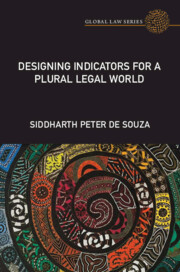Book contents
- Frontmatter
- Dedication
- Contents
- Acknowledgements
- 1 Introduction
- 2 ‘Meanings’, ‘Trust’ and ‘Power’: Critical Perspectives on Legal Indicators
- 3 Rule of Law Promotion, Legal Indicators and Legal Pluralism
- 4 Epistemic Diversity and Voices from the Global South: Countering the Managerial Implications Of Measuring Justice
- 5 A Capability Approach to Access to Justice in Plural Legal Systems
- 6 Conclusion
- Appendix
- Bibliography
- Index
6 - Conclusion
Published online by Cambridge University Press: 29 July 2022
- Frontmatter
- Dedication
- Contents
- Acknowledgements
- 1 Introduction
- 2 ‘Meanings’, ‘Trust’ and ‘Power’: Critical Perspectives on Legal Indicators
- 3 Rule of Law Promotion, Legal Indicators and Legal Pluralism
- 4 Epistemic Diversity and Voices from the Global South: Countering the Managerial Implications Of Measuring Justice
- 5 A Capability Approach to Access to Justice in Plural Legal Systems
- 6 Conclusion
- Appendix
- Bibliography
- Index
Summary
The aim of this book has been to understand the role of quantification in law and its impact on law and development, and judicial reform. It has sought to examine how different institutions shape the making and use of legal indicators. The relevance of this research is evident in that, at the 51st Session of the UN Statistical Commission in March 2020, the issue of indicators and data related to governance was on the agenda. One of the items for discussion within this agenda was a report, which suggested developing a new indicator to measure access to justice and also articulated that any measurement must start from ‘the perspective of people and communities’.
This book aspired to shed light on the limitations of existing quantification tools, which measure the rule of law, and their lack of engagement with concepts and frameworks from plural legal worlds. In addition to a critique of existing frameworks of legal indicators, the book also offers an alternative framework for the measurement of the dispute resolution processes in plural legal orders. This expands beyond an institutional approach to the rule of law to a bottom-up, user-centred approach that places importance on the legal needs and challenges of people through adopting the wider concept of access to justice. Keeping in mind the interdisciplinary nature of the research, the book adopted a socio-legal approach to unpacking not just the frameworks behind rule of law indicators, but also how they impact the social worlds around them. In particular, the book has advanced the idea that we need to incorporate the rule of law as a concept within the more expansive idea of access to justice. This argument is made because access to justice is broader and more flexible as a concept and is able to include different narratives and life worlds.
Through the course of the book, I have examined the views of critics on how quantification simplifies the functioning and complexity with which disputes in legal systems are evaluated. Engaging with these critical challenges to the use of indicators, I have aimed to build a consolidated response to these criticisms by looking at how to build legal indicators that are cognizant of diverse epistemologies of knowledge around justice and the variety and diverse nature of how disputes are resolved in plural legal systems.
- Type
- Chapter
- Information
- Designing Indicators for a Plural Legal World , pp. 204 - 214Publisher: Cambridge University PressPrint publication year: 2022



